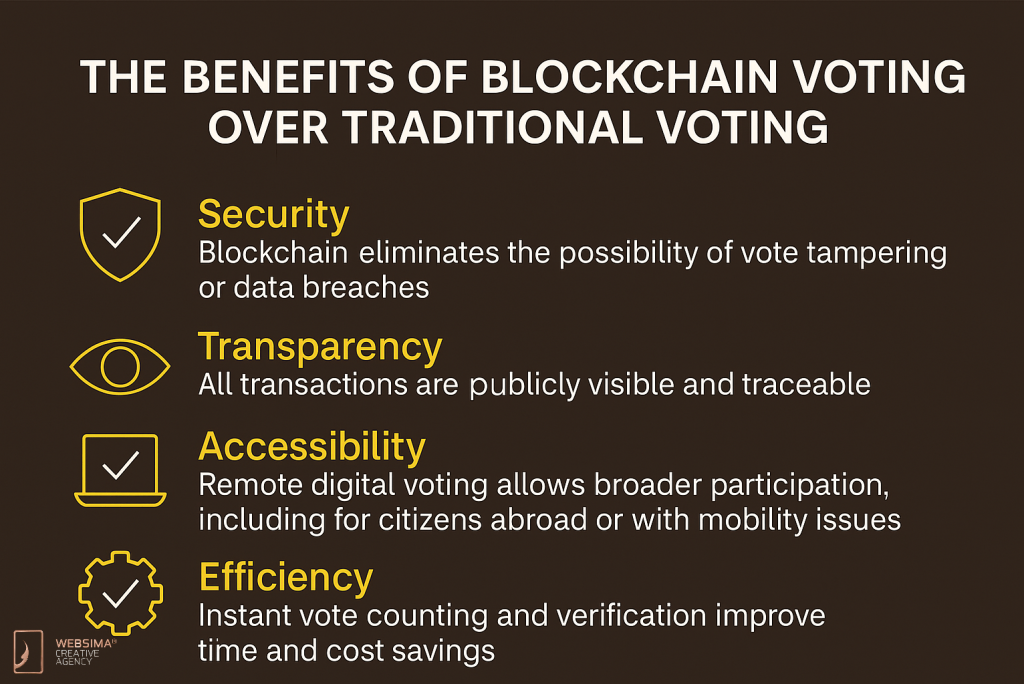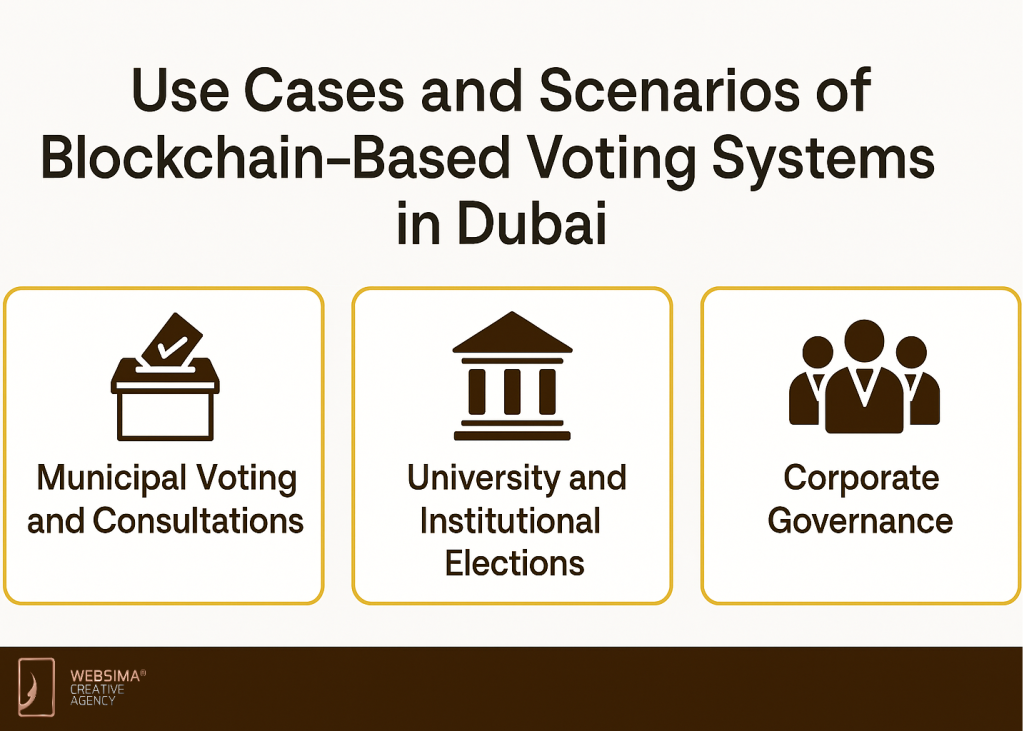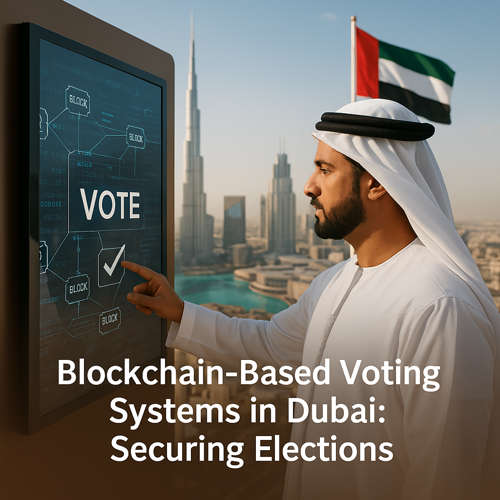As the UAE continues to pioneer smart city transformation and digital governance, blockchain is becoming a crucial tool in ensuring transparency and trust in public processes. Among its most promising applications is the use of blockchain for voting. Dubai’s interest in blockchain voting initiatives is a strategic move aiming to implementing blockchain voting systems in Dubai for elections. This is for improving voter participation, and eliminating fraud in the electoral process.
This article explores how blockchain technology is usable in Dubai’s voting infrastructure, the potential it holds for electoral integrity, and the steps the city is taking to lead globally in digital democracy.
What Is Blockchain Voting?
BREAKING
Trump and DOGE are exploring a Federal Blockchain based election voting and identity system!
The system will be built in partnership between X, CARDANO, Hyperledger and Hedera. pic.twitter.com/KkU7G7A7if
— Sssebi (@Av_Sebastian) November 14, 2024
How It Works
Blockchain voting is a digital system that allows votes to be recorded on a decentralized, tamper-proof ledger. Each vote is encrypted and added to the chain in real time, ensuring transparency, auditability, and resistance to fraud or manipulation.
Unlike traditional electronic voting, blockchain does not rely on a single server. Instead, it distributes the data across a network, reducing the risks of hacking and ensuring every vote is accounted for.
The Benefits Over Traditional Voting

- Security: Blockchain eliminates the possibility of vote tampering or data breaches.
- Transparency: All transactions are publicly visible and traceable.
- Accessibility: Remote digital voting allows broader participation, including for citizens abroad or with mobility issues.
- Efficiency: Instant vote counting and verification improve time and cost savings.
Dubai’s Vision for Blockchain Voting
Smart Governance and the Dubai Blockchain Strategy
Launched in collaboration with Smart Dubai and the Dubai Future Foundation, the Dubai Blockchain Strategy aims to position the city as a global leader in blockchain adoption. The strategy outlines the implementation of blockchain across Dubai’s government services, with voting being a key area of exploration.
Dubai has already digitized a significant portion of its government services. Integrating voting into this ecosystem would further streamline civic engagement and enhance electoral transparency.
Pilot Projects and Innovations
While national elections are not currently held in the UAE, Dubai has explored blockchain voting in shareholder meetings and internal governance. For instance, the Abu Dhabi Securities Exchange (ADX) has implemented blockchain e-voting for shareholder assemblies, demonstrating practical feasibility and public trust in blockchain-secured ballots.
These small-scale implementations serve as proof of concept for broader use in civic elections or municipal decision-making processes.
The Role of Technology and Infrastructure
Digital Identity Integration
To make blockchain voting Dubai systems work, a secure and verified digital identity system is required. The UAE Pass—a government-backed digital ID—provides a reliable authentication layer, ensuring only eligible voters can cast ballots.
Infrastructure Readiness
Dubai has integrated Web3 into its smart city initiatives through the city’s smart infrastructure, including 5G connectivity and cloud computing platforms, and supports seamless deployment of decentralized applications. As part of the larger Digital Dubai initiative, blockchain-based voting could be integrated into a wider network of e-governance services.
Survey Data and Public Readiness
Global Trends and Local Perception
While UAE-specific survey data is limited, public enthusiasm for smart governance and high smartphone penetration rates signal strong readiness for blockchain-enabled civic participation.
Trust and Adoption Challenges
According to PwC’s 2022 Global Blockchain Survey, 84% of Middle East businesses believe blockchain will be mainstream by 2030, yet many point to lack of regulatory clarity and technical expertise as barriers. Dubai’s approach to structured, transparent blockchain policies could overcome these obstacles in the voting sector.
Use Cases and Scenarios in Dubai

Municipal Voting and Consultations
Blockchain voting can be deployable in local councils and community decisions, allowing residents to participate in district-level decisions securely and efficiently.
University and Institutional Elections
Dubai’s academic institutions could implement blockchain voting for student government and board elections, providing early exposure and trust-building among younger generations.
Corporate Governance
Beyond government elections, many private companies and financial institutions in Dubai are exploring blockchain-based shareholder voting, particularly in remote or international contexts.
Challenges and Solutions
Regulatory Framework
Implementing blockchain voting Dubai will require updates to the existing legal and electoral frameworks to ensure ballots are recognized and validated under UAE law.
Technical Literacy
Ensuring all citizens can participate fairly means addressing digital literacy and accessibility. Education campaigns and simplified interfaces will be essential.
Cybersecurity and Scalability
As with all digital systems, security remains a priority. Fortunately, Dubai’s investment in cybersecurity and decentralized systems provides a strong foundation for scalable, secure voting applications.
Future Outlook
Blockchain voting is still in its early stages globally, but Dubai is at a good position to lead the transformation. With continued government support, private sector innovation, and strong public infrastructure, blockchain voting Dubai systems may soon be part of the mainstream democratic process.
As global attention turns toward transparency in elections, Dubai’s model could offer a replicable blueprint for modern governance powered by blockchain.
Conclusion
Dubai’s push for blockchain integration is laying the groundwork for secure, transparent, and efficient voting systems. By leveraging blockchain’s core strengths—immutability, decentralization, and traceability—the emirate is taking significant steps toward transforming civic engagement. As blockchain voting Dubai initiatives mature, they promise not only to enhance electoral integrity but to set new standards for digital democracy worldwide.
Websima: Empowering Dubai’s Blockchain Future
Websima is a trusted blockchain service provider based in Dubai, delivering tailored blockchain solutions for businesses, institutions, and public sector organizations. Our services include:
- Blockchain architecture and smart contract development
- Decentralized applications for civic and institutional voting
- Blockchain integration into existing digital ID and authentication systems
- Legal and compliance support for blockchain and Web3 deployment
- Turnkey consulting for government and enterprise blockchain projects
At Websima, we help you design and implement secure, scalable blockchain voting platforms that comply with the UAE’s regulations and digital transformation goals.
Ready to explore the future of digital democracy?
Contact Websima today and lead the way in blockchain-powered governance.





